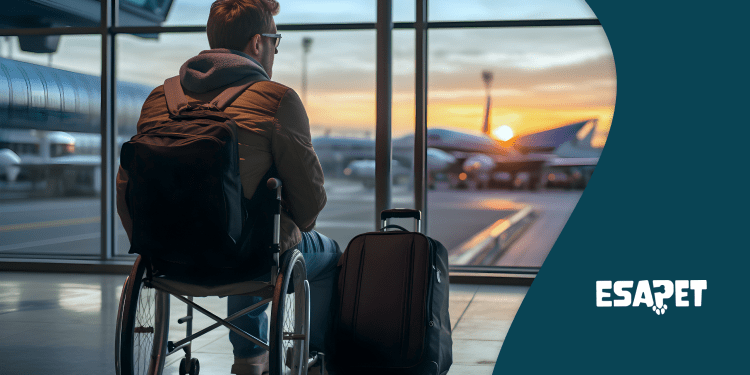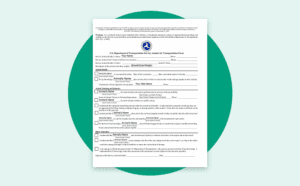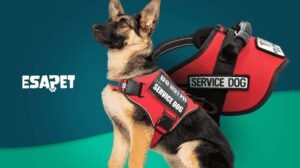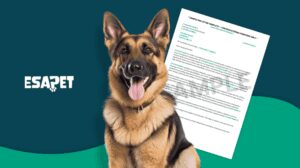Air Carrier Access Act: Guide for Traveling with a Disability

The Air Carrier Access Act (ACAA) is a federal law that protects the rights of passengers with disabilities when flying. Enforced by the U.S. Department of Transportation, the ACAA ensures that airlines provide equal access — from mobility assistance and accessible seating to traveling with service animals.
Originally passed in 1986, the law prohibits discrimination and sets clear rules for how airlines must accommodate disabled passengers. Recent updates, including the 2021 removal of emotional support animals (ESAs) from the service animal category, have reshaped how travelers fly with companion animals.
In this guide, you’ll learn what the ACAA covers, what changed for ESAs, what assistance is available, and how to protect your rights when traveling by air.
ACAA Meaning: What Is the Air Carrier Access Act?
The Air Carrier Access Act (ACAA) is a pivotal U.S. federal law passed in 1986 that prohibits discrimination against individuals with physical or mental disabilities in air transportation.
Codified under Title 14, Code of Federal Regulations, Part 382 (14 CFR Part 382), the ACAA was a landmark achievement in civil rights, predating the broader Americans with Disabilities Act (ADA) of 1990 and addressing the unique challenges faced by disabled individuals in the aviation sector.
While the ADA covers accessibility in schools, workplaces, and other public spaces, the ACAA fills the gap in the sky — applying specifically to air travel. The law applies to:
- All U.S.-based airlines, regardless of where they fly.
- Foreign airlines operating flights to or from the United States.
Why Does the ACAA Matters?
According to a 2019 DOT report, about 27 million passengers with disabilities travelled by air in the U.S. Commercial aviation is a vital link for employment, medical care, and family life — and the ACAA ensures that these individuals are not unfairly excluded or burdened.
The law reflects a broader commitment to equity and human dignity, recognizing that air travel is not a luxury, but a right — one that must be accessible to everyone.
For someone who uses a power wheelchair or flies with a service dog, the ACAA ensures they aren’t forced to stay grounded — literally or figuratively.
What Does the ACAA Require from Airlines?
Under the ACAA, airlines must:
- Assist passengers using wheelchairs — from check-in to boarding.
- Provide accessible seating and, on wide-body planes, accessible lavatories.
- Ensure staff are trained in disability sensitivity and mobility equipment handling.
- Allow trained service dogs to travel with their handler.
- Have a Complaints Resolution Official (CRO) available at every airport.
Failure to comply with ACAA regulations may result in civil penalties and complaints filed with the U.S. Department of Transportation (DOT).
Enforcement and Oversight
The U.S. Department of Transportation (DOT) enforces compliance with the ACAA. Airlines that fail to meet these requirements may be subject to fines and corrective actions. Travelers can file complaints directly with the DOT’s Aviation Consumer Protection Division.
Emotional Support Animals and the ACAA: What Changed?
For years, emotional support animals (ESAs) were accepted under the ACAA. However, due to increasing abuse and safety incidents, the DOT revised regulations in 2020, effective January 2021.
What Changed:
- ESAs are no longer considered service animals.
- Airlines are not required to allow ESAs in the cabin for free.
- ESA owners must now transport them as pets, subject to pet policies and fees.
What You Can Do:
- Some airlines offer special pet support options.
- ESAs may still be used for therapeutic benefits, just not with the same travel privileges.
- A valid ESA letter may help when arranging housing or alternative accommodations — but not air travel.
Service Animals Under the ACAA
The Air Carrier Access Act (ACAA), as implemented by the U.S. Department of Transportation (DOT) under 14 CFR Part 382, provides specific guidelines regarding the transportation of service animals on commercial flights. The most recent revisions, effective from January 2021, clarify and tighten the definition and requirements for service animals, aiming to balance accessibility needs with safety and operational concerns.
Definition of Service Animals
According to 14 CFR § 382.117, the DOT defines a service animal as:
“a dog that is individually trained to do work or perform tasks for the benefit of a qualified individual with a disability, including a physical, sensory, psychiatric, intellectual, or other mental disability.”
This definition explicitly excludes animals that provide only emotional support, comfort, or companionship, such as emotional support animals (ESAs), which are no longer granted the same rights under the ACAA for air travel.
The definition also limits the service animal classification to dogs only.
Documentation and Passenger Requirements
To ensure the safe and appropriate transport of service animals, airlines may require passengers to complete and submit a Service Animal Air Transportation Form (as per 14 CFR § 382.117(d)). This form verifies critical information such as:
- Training: Confirmation that the dog is trained to perform specific tasks related to the passenger’s disability.
- Health and Behavior: Certification that the animal is healthy and does not pose a direct threat to others.
- Bladder Control: For flights lasting over 8 hours, confirmation that the animal can hold its bladder during the duration of the flight or that arrangements have been made.
Passengers must submit this form within 48 hours prior to the scheduled flight to allow airlines time to prepare accommodations.
Limitations and Airline Discretion
The regulations impose certain limitations and conditions to maintain safety and comfort for all passengers:
- Number of Service Animals: Airlines may limit the number to two service animals per passenger.
- Behavior and Control: Airlines have the authority to deny boarding or remove an animal if it:
- Exhibits aggressive or disruptive behavior (e.g., barking, growling, biting).
- Is not properly harnessed or leashed.
- Is not under the handler’s control during the flight.
These provisions are detailed in 14 CFR § 382.117(e), which states that carriers may refuse transport of animals that are “a direct threat to the health or safety of others” or cause “a fundamental alteration of the nature of the service.”
Handler Responsibilities
Passengers traveling with service animals are responsible for ensuring their animals are:
- Well-behaved and trained.
- Equipped with appropriate restraints.
- Accompanied by any necessary documentation.
- Able to relieve themselves before and after the flight.
Importance of These Regulations
These clear rules promote the safety of all passengers, protect the rights of individuals with disabilities, and reduce the number of incidents involving untrained or misbehaving animals on board.
The DOT’s 2020 Final Rule was a response to numerous reports of airline incidents involving untrained animals and fraudulent ESA claims, aiming to ensure that only truly trained service dogs receive the accommodations guaranteed by law.
Get your Official PSD Letter Consultation from a licensed therapist.
Get PSD Letter Now
Flying with a Disability: Your Rights and Assistance
Under the Air Carrier Access Act (ACAA) and its implementing regulations (14 CFR Part 382), passengers with disabilities are guaranteed a broad range of services to ensure equal access to air travel. These accommodations are provided free of charge and are designed to support travelers from the curbside all the way to their final destination.
Available Assistance Services
Airlines and airports must offer:
- Curb-to-Gate Wheelchair Assistance: Trained personnel are required to assist passengers from the curb or parking area, through airport security, all the way to the boarding gate. This service also includes help with boarding and deplaning.
- Priority Security Screening: Travelers with disabilities may receive expedited screening procedures at Transportation Security Administration (TSA) checkpoints, including alternative screening methods tailored to their needs.
Early Boarding: Passengers with disabilities are entitled to board before the general boarding group to allow extra time for seating and securing mobility devices. - Help with Connections and Baggage: When making connecting flights, passengers should receive assistance navigating between gates and retrieving checked mobility aids or assistive devices.
Important Considerations and Passenger Responsibilities
- While advance notice is not legally required for most disability accommodations, it is strongly recommended—typically at least 48 hours before travel—to ensure airlines can make proper arrangements, especially for specialized equipment or animal transport.
- Airlines are required to properly tag, handle, and return mobility devices (such as wheelchairs, scooters, or walkers) in the same condition they were received. This responsibility is outlined in 14 CFR § 382.75.
- To protect against damage or loss, passengers are advised to document the condition of their mobility aids with photos before check-in. This documentation can be crucial if disputes arise.
Enforcement and Recourse
If assistance is not provided as required, passengers can file complaints with the airline and escalate issues to the Department of Transportation’s Aviation Consumer Protection Division. The DOT actively investigates violations and enforces compliance with ACAA mandates.
6 Tips to Help People with Disabilities Fly Smoothly
- Notify the airline of your needs at booking or at least 48 hours in advance.
- Submit required documentation, if traveling with a service animal.
- Arrive early to receive support (usually 2 hours before domestic flights).
- Proceed through TSA with assistance and alternative screening, if necessary.
- Board early or via aisle chair when needed.
- Request seating accommodations, like aisle access or bulkhead seats.
What Airline Is Best for People with Disabilities?
Choosing the right airline can make a significant difference in the travel experience for people with disabilities. Accessibility isn’t just about meeting legal requirements — it’s about providing compassionate, efficient, and reliable service tailored to your needs. Here are the key factors to consider when selecting an airline:
Key Considerations for Accessibility
Traveler Reviews and Testimonials
Look for feedback from passengers with disabilities. Firsthand accounts reveal how well an airline handles accommodations, communication, and unexpected challenges. Platforms like Skytrax, AirlineRatings, and disability-focused travel forums provide valuable insights.
Availability of Trained Staff
Airlines that invest in comprehensive disability training for their employees tend to offer smoother, more respectful service. Trained gate agents, flight attendants, and support personnel understand the nuances of mobility assistance, service animals, and communication aids.
Accessible Facilities
Accessibility extends beyond the aircraft cabin. Consider whether the airline’s hubs and major airports offer fully accessible restrooms, wheelchair-accessible boarding ramps, and adequate assistance throughout the terminal.
Complaint Resolution and Track Record
Review data from the U.S. Department of Transportation (DOT) on disability-related complaints. Airlines with lower complaint rates and strong customer service response times often demonstrate better overall compliance and care.
Airlines Often Praised for Their Accessibility Efforts
- Delta Air Lines
Delta consistently ranks high for its commitment to disability services. The airline provides accessible seating options, personalized assistance, and accessible in-flight entertainment. Their staff regularly undergo disability sensitivity training to improve passenger interactions. - Alaska Airlines
Known for exceptional customer service, Alaska Airlines has received accolades for well-trained personnel and accommodating policies. They are proactive in assisting passengers with disabilities, including those traveling with service animals. - Southwest Airlines
Southwest’s straightforward boarding process, including early boarding for passengers with disabilities, and generous baggage policies make it a popular choice. Their reputation for friendly staff and effective communication contributes to high satisfaction ratings among disabled travelers.
Additional Resources
For the most recent data on disability-related complaints and enforcement actions, consult the DOT Aviation Consumer Protection Division’s Disability-Related Complaints Summary. This resource helps you identify airlines with the best track records and highlights common issues to watch for.
Get your Official ESA Letter Consultation from a licensed therapist.
Get ESA Letter Now
How Long Can a Passenger Be Left in a Wheelchair Unattended?
The U.S. Department of Transportation (DOT) and Federal Aviation Administration (FAA) regulations prioritize the safety and dignity of passengers with disabilities, including those who rely on wheelchairs for mobility. While there is no specific federal statute that sets an absolute maximum time a passenger can be left unattended in a wheelchair, guidance and best practices strongly discourage excessive waiting times due to the potential risks of physical discomfort, health complications, and emotional distress.
Recommended Guidelines and Expectations
- No More Than 30 Minutes Without Check-Ins
Industry best practices and disability advocacy groups recommend that passengers should not be left unattended in wheelchairs for more than 30 minutes without regular check-ins from airline or airport staff. Regular communication reassures the passenger and ensures timely assistance. - Prompt and Timely Service Is Required
Airports and airlines are expected to provide efficient, coordinated support for wheelchair users. This includes timely assistance during boarding, transfers, security screening, and deplaning to avoid unnecessary delays. - Accountability and Responsibilities
Airlines are responsible for coordinating their staff and contractors to prevent passengers from being left stranded or unattended. Neglect or miscommunication leading to extended unattended periods may be considered a violation of the Air Carrier Access Act (ACAA) and other accessibility laws.
What to Do If Left Unattended Too Long?
If you find yourself or someone else left unattended in a wheelchair for an excessive period:
- File a Formal Complaint with the Airline
Contact the airline’s disability assistance or customer service department promptly to report the incident. - Report to the DOT Air Consumer Protection Division
The DOT accepts complaints related to disability rights violations during air travel. Passengers can file complaints online or by phone. The DOT reviews these reports and may investigate or take enforcement action against the carrier.
Additional Considerations
- Document the Incident
Keep records of waiting times, communications with staff, and any physical or emotional impact caused by the delay. - Advocate for Yourself
Request regular updates and assert your rights under the ACAA to receive timely assistance.
Conclusion – Travel with Dignity: Know Your Rights Under the ACAA
Flying with a disability should never mean compromising your dignity, comfort, or safety. The Air Carrier Access Act exists to empower you with rights, ensure access, and hold airlines accountable.
Whether you’re traveling with a service animal, need special equipment, or require onboard assistance, knowing your rights is the first step to stress-free travel. If you feel those rights were violated, don’t hesitate to report it — your voice drives change.
Need ESA support for housing instead? Learn more at ESAPet.com, where you can get connected with licensed mental health professionals and receive valid ESA letters — online, fast, and secure.






